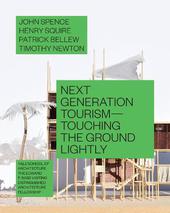
|
Next Generation Tourism: Touching the Ground Lightly
Paperback / softback
Main Details
Description
The book features current sustainability and material research and design for innovative strategies centered around ecology, sustainability, and the rise of future tourism models on the resort island of Gili Meno, Indonesia. It focuses on sustainability of materials, climate issues, and development in fragile island areas where exploitation of resources are being monitored for future development. It is said that our actions impact the environment seven generations into the future. In fact the growing concern about the global impact of tourism and the associated waste produced by leisure industries is outdated. This Yale graduate advanced architecture studio analyzed the current ecological conditions, indigenous architecture styles, and resort culture of Gili Meno, a tiny remote island off the coast of Lombok, Indonesia, to generate next-generation models of tourism. "We've also seen a huge rise in awareness of sustainability in terms of holidaying patterns and resort developments. I wouldn't say that 30 years ago people were blind to these issues, but there's certainly much more education and consciousness now about global warming and other issues. So whether a developer sincerely believes it needs to incorporate sustainability or sees a commercial advantage in being sustainable, there's no discrepancy. A commercial advantage validates the need to be sustainable because there's nothing less sustainable than a failed resort." --John Spence
Author Biography
John Spence, Founder and Chairman of Karma Group, one of the world's most respected trail-blazers and free-thinkers in the fields of travel and entertainment. Partner at Squire & Partners, where his current projects include 20 Grosvenor Square and Chelsea Barracks in London, Trinity Place in St Petersburg and the Msheireb Heart of Doha development in Qatar. He also manages the practice's own property developments. Founding director of Atelier Ten, Patrick is one of the UK's Royal Designers and is a Chartered Building Services Engineer with more than thirty years' experience in the design of high performance buildings and systems. With extensive experience in the integration of environmental and building systems with architecture, Patrick has particular expertise in thermal mass energy storage technologies, environmental building design and high efficiency building conditioning systems. Nina Rappaport is an architectural critic, curator, and educator. She is publications director at Yale School of Architecture and editor of the biannual publication Constructs (numbering 35), the exhibition catalogs (numbering 48), as well as the school's book series (22 to date) and director of the project/think tank the Vertical Urban Factory. Yale University, Yale School of Architecture, Graduate Student. Studies Architectural Engineering, Business, and Economics.
Reviews"Expertly written by John Spence, Henry Squire and Patrick Bellew, then collaboratively compiled and co-edited by the team of Nina Rappaport and Rukshan Vathupola, "Next Generation Tourism: Touching the Ground Lightly" is highly recommended for governmental, corporate, college and university library collections with its focus on the sustainability of materials, diverse climate issues, and development in fragile island areas where exploitation of resources are being monitored for future development. A seminal study of immense value for innovative strategies centered around ecology, sustainability, and the rise of future tourism models on the resort island of Gili Meno, Indonesia and would be applicable to similar island and coastal cultures." --Midwest Book Review
|